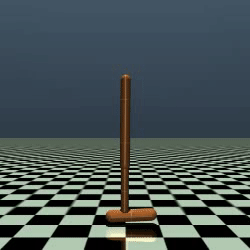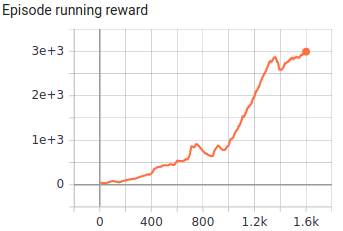TD3 (Twin Delayed Deep Deterministic Policy Gradient) is somehow the equivalent of Double Q-Learning in Continuous Domain. To avoid overestimation existed in DDPG method, a similar trick from Double Q-Learning is used: Disentangle Action Selection part from Action Evaluation in the Bellman Equation by using two separate networks.
TD3 also uses some tricks (like Target Policy Smoothing ) to reduce high variance common in Policy Gradient methods.
| Ant | Hopper |
|---|---|
 |
 |
x-axis: episode number.
| Ant | Hopper |
|---|---|
 |
 |
- Pendulum-v0
- Hopper-v2
- Ant-v2
- HalfCheetah-v2
- gym == 0.17.3
- mujoco-py == 2.0.2.13
- numpy == 1.19.2
- opencv_contrib_python == 4.4.0.44
- psutil == 5.5.1
- torch == 1.6.0
pip3 install -r requirements.txtusage: main.py [-h] [--mem_size MEM_SIZE] [--env_name ENV_NAME]
[--interval INTERVAL] [--do_train]
Variable parameters based on the configuration of the machine or user's choice
optional arguments:
-h, --help show this help message and exit
--mem_size MEM_SIZE The memory size.
--env_name ENV_NAME Name of the environment.
--interval INTERVAL The interval specifies how often different parameters
should be saved and printed, counted by episodes.
--do_train The flag determines whether to train the agent or play
with it.- In order to train the agent with default arguments , execute the following command (You may change the memory capacity and the environment based on your desire.):
python3 main.py --mem_size=700000 --env_name="Ant-v2" --do_train- Remove
do_trainflag to change the mode from training to testing.
python3 main.py --env_name="Ant-v2" # <- Test the agent